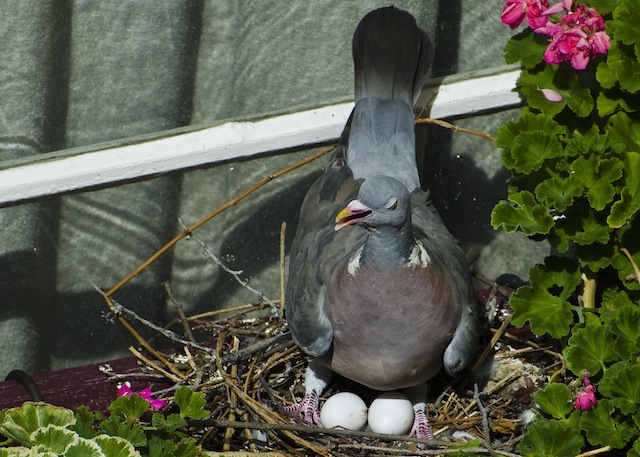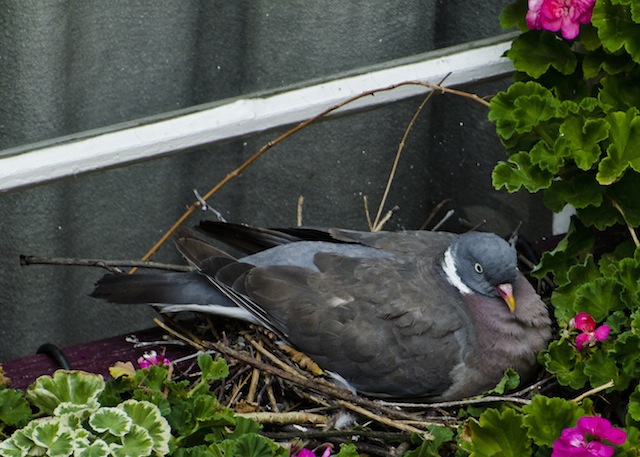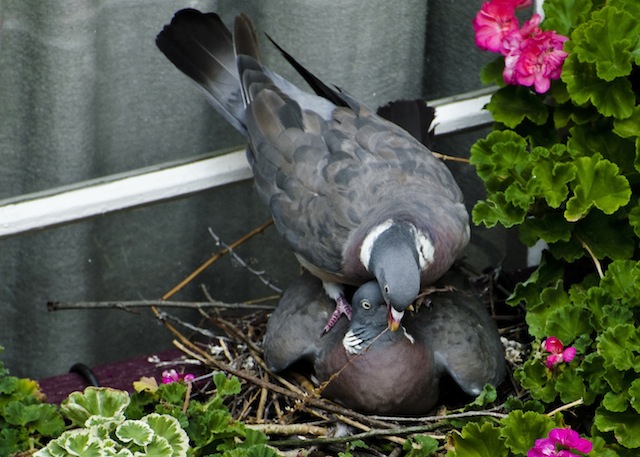Conversation Entre Les Tourterelles
 09.16.2011
09.16.2011 
Madame Tourterelle: It was terrible.
Monsieur Tourterelle: Yes, you told me. I believe you.
Madame Tourterelle: But you weren’t there. You can’t imagine how sad it was. As if you were watching one of our children—but fifty times as heavy, with no wings—try to fly from the nest a few days after he was hatched.
Monsieur Tourterelle: That I can’t imagine. We guard them and feed them day and night until they’re strong enough to fly on their own.
Madame Tourterelle: Humans really don’t have wings.
Monsieur Tourterelle: That’s obvious.
Madame Tourterelle: But this is the first time I felt it viscerally.
Monsieur Tourterelle: Was he fully fledged?
Madame T: Oh yes. You knew him. The one who put out morsels for us on his windowsill.
Monsieur T.: He never had any others of his kind visiting him.
Madame T.: This is what I don’t understand. In Asia, humans are rarely alone. Or that’s what my great-great grandmother told me.
Monsieur T.: I heard the same thing from my great-grandfather, who lived in Key West. He said humans knocked on the doors of new neighbors, and welcomed them, invited them over.
Madame T.: The woman who lived below him was a world traveler, a wise, warm-hearted soul. I heard her say the other day—
Monsieur T.: —Oh dovey, don’t tell me you’re learning human speech now!?
Madame T.: What else do I have to do all night, sitting on those eggs? She leaves her windows open. Friends visit. I heard her telling one of them about the fall. She said she’d wanted to welcome him to the building when he moved in. But you don’t do that in France. She’d heard from his landlord that he was French, but not from Paris, an engineer in his 30s, shy. That was all she knew.
Monsieur T.: Did she see him fall?
Madame T.: Are you asking me a sensationalistic question?
Monsieur T.: Non, ma chère, I’m just wondering if he got confused and thought he could fly.
Madame T.: He jumped! The woman was so shaken, thinking if only this custom of reserve between neighbors wasn’t so strong here, she would have welcomed him, been a friend.
Monsieur T.: Because he was lonely.
Madame T.: Of course he was. It’s easy for us tourterelles. We pair up, have two kids every few months, help each other feed and raise them, and stay together for life.
Monsieur T.: Life seems to be more complicated for humans.
Madame T.: Coo COO coo. That’s the truth. Did you find us another home?
Monsieur T.: I did. It’s in the fifth arrondissement, quite beautiful, among some pink geraniums.
Madame T.: You’re wonderful. Is it safe?
Monsieur T.: These particular humans never open their windows.
Madame T.: Is it soft?
Monsieur T.: A bit too twiggy for my taste.
Madame T.: I’ll fluff it up with some feathers.
Monsieur T: There IS one thing… A human on the next floor up seems like a spy or something. He has this thing set up that looks like a miniature Eiffel Tower holding a big round eye that’s watching the nest. Sometimes two of them take turns looking through that eye.
Madame T.: They’re probably studying us for hints on how to live. How to be calm, productive and peaceful. Content with whatever life brings your way.
Monsieur T.: As long as it’s not a hawk.
Madame T.: Oui, mon amour, anything but that. Shall we help them out?
Monsieur T.: Coo COO coo!
 French culture,
French culture,  birds,
birds,  doves,
doves,  neighbors,
neighbors,  suicide in
suicide in  Paris Life
Paris Life 










